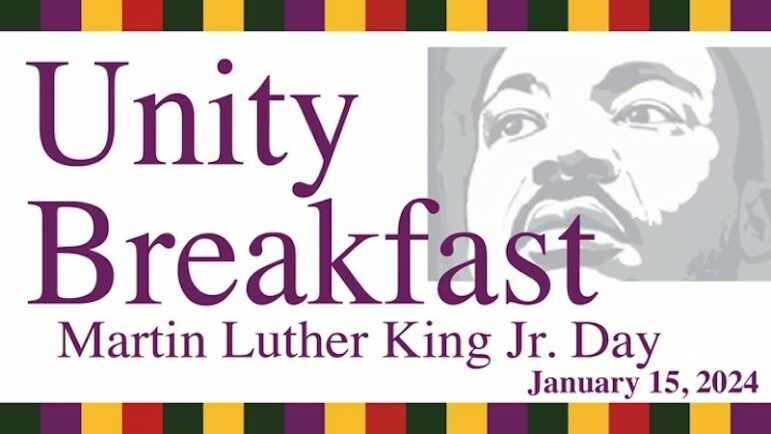
A group that provides support to refugees, a resident who created a group for LGBTQ+ people, and longtime social activists were honored during the 2024 Watertown Unity Breakfast.
On Martin Luther King Jr. Day, Watertown held the annual celebration of the civil rights leader’s work for the 24th time. It is organized by the World in Watertown. As with the past three years, the 2024 version was held virtually with a broadcast on Jan. 15.
The theme of this year’s Unity Breakfast was “The Kingian Nonviolence Philosophy: Listen, Learn, Grow, and Act.” The broadcast, produced by Watertown Cable Access Television, included musical performances from the Youth in Unity event on Jan. 9 at Lowell School. Songs were performed by the All-City Chorus, the Combined District Chorus, and Christina and Friends.
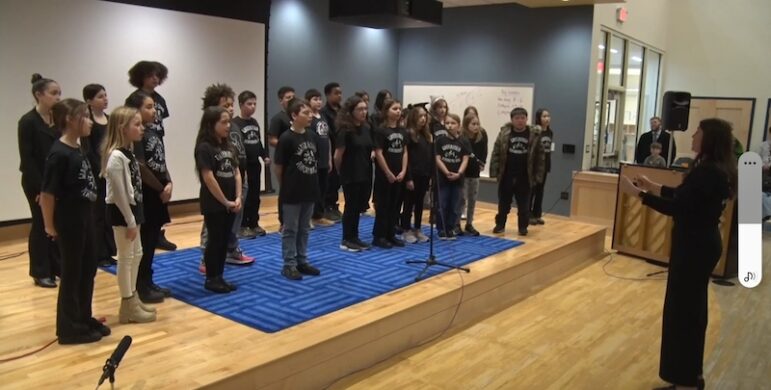
Unity Award
Each year the Unity Breakfast committee honors an individual or organization for outstanding service in Watertown. This year, the Refugee Support Group, a working group of Watertown Citizens for Peace, Justice, and the Environment.
The group began in 2015 in an effort to rally assistance for refugees coming to the area during the war in Syria. The group is also part of the Massachusetts Immigrant and Refugee Advocacy Coalition, also called MIRA.
The group’s first effort was to help a family who settled in Lowell, and soon afterward the father died of cancer. They helped pay for a marker for his grave.
Since then, they have supported families and individuals coming from Afghanistan, Iraq, Iran, Central America, Haiti, the Dominican Republic, Uganda, and other countries, said Xin Peng, the Chair of the Board of World in Watertown.
“In recent years the support group’s effort has become more locally focused,” Peng said. “Currently, a small group of volunteers works tirelessly on almost a daily basis to help newcomers from other countries to find clothing and shelter, enroll their children in school, obtain health care, apply for refugee status, attend English language classes, and address many other basic needs.”
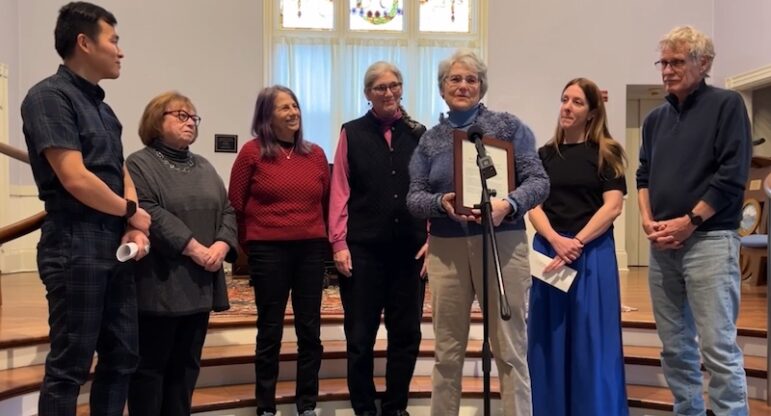
Sue-Ellen Hershman-Tcherepnin, founder of the Watertown Refugee Support Group, accepted the award during a ceremony at First Parish Church.
“Our group is so blessed to have that sort of recognition from the World in Watertown, from the planning committee, from all the various parts that make this happen every year,” Hershman-Tcherepnin said. “It’s especially just a wonderful honor for us, and I have to say that all these wonderful members of our group who I adore, and adore each other.”
The Unity Breakfast Committee also presented the Sue Kuder Unsung Hero Award, which was founded in memory of a Watertown activist and former World in Watertown board member who passed away unexpectedly in 2020. She worked hard on behalf of multiple social justice initiatives, but shun the spotlight.
In 2024, the Sue Kuder Award was presented to three people. First to Erik and Tyler Kemp-Benedict, a husband and wife team who organized many vigils in Watertown Square, and advocated for the Black community and other marginalized communities in Watertown. They recently moved to England, where Eric received a position as a professor.
The committee also posthumously honored Susan Klaw, who passed away in December. She was an early member of the World in Watertown board, and helped with the transition from the old guard who founded the group to a new generation of community leaders.
Scholarships
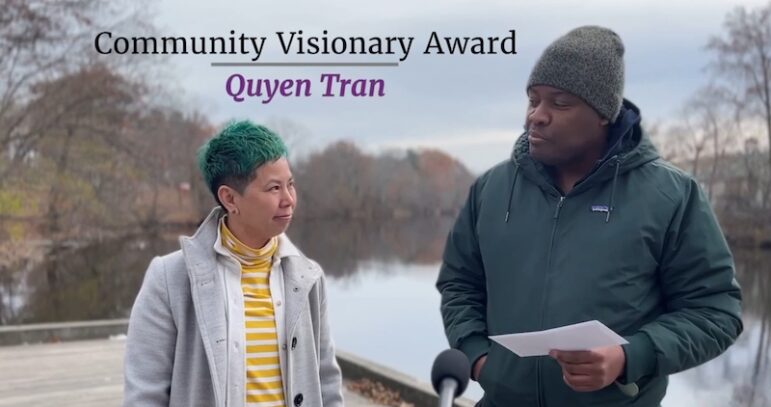
The Unity Breakfast will be awarding a scholarship to a student from the Watertown Public Schools in the spring of 2024, and it awarded a Watertown Community Visionary Award to Quyen Tran who works to support the LGBTQAI+ community, and is creating a safe space for people of color in the community, said Ben Jerome, who presented the award for the Unity Breakfast committee.
“Having come to the United States as a Vietnamese refugee, I’ve seen and learned that the healthiest communities are ones based on diversity where folks are celebrated for who they are,” Tran said. “I know from personal experience, people gravitate to where they are celebrated, and I believe every single one of us has something to offer the community regardless of how you view yourself. Thank you for selecting me as your recipient for your grant.”
MLK Essay Contest Winners
Students at Watertown Middle School and Watertown High School write essays about how Martin Luther King Jr. how the words and teachings of Martin Luther King Jr. have influenced them. The best are reviewed by a panel of readers and the top essay from each school is selected.
The middle school winner, Marie Toure, wrote about her experience being biracial, with a Taiwanese-American mother and a father from Senegal. Both have experienced racism including her mother having eggs thrown at her along with slurs, and her father being racially profiled by police.
Toure has had her ethnicity questioned, and has had racial slurs directed her way in school and other places. She has also been told that “I don’t act my race” because of the way she speaks and dresses.
“All these situations started to pile up and affect my sense of who I am,” Toure said. “I started to question my identity and feel lost in finding my true self.”
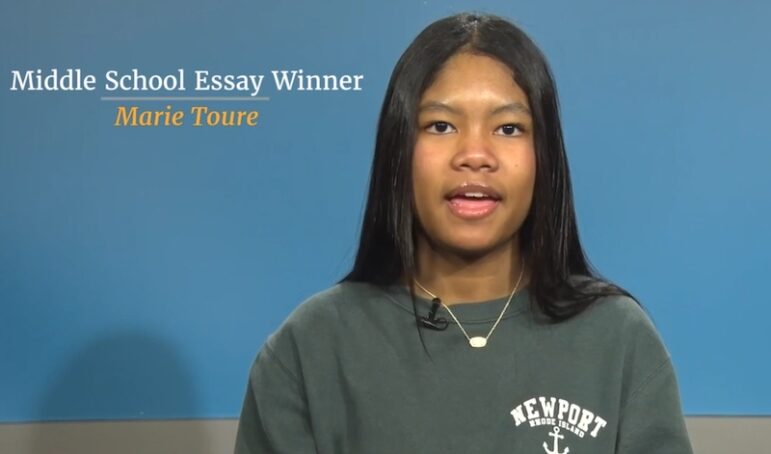
She quoted MLK’s “I Have a Dream” speech, when he said, “I had a dream that my four children will one day live in a nation where they will not be judged by the color of their skin, but by the content of their character.”
“Although he made this statement 60 years ago, the fact that me, my parents and many other people are still experiencing colorism and racism to this day shows that we still have a lot of room to improve,” Toure said. “I hope that in the next 60 years, Watertown Middle School eighth-graders won’t be able to write about racist experiences because the world will be a better place.”
The winning high school essay dealt with a recent hate crime that hit home for the writer, Nairi Davidian. As an Armenian, she learned about the atrocities endured the Armenian Genocide, but she said she did not think that “1915 Never Again” would be contradicted today.
In 2023, 100,000 Armenians were displaced from Artsakh, a region which is claimed by both Armenia and Azerbaijan. She was concerned that many did not recognize the even as ethnic cleansing, and that people justified what happened by citing the suffering of the other side during previous disputes between the two sides.
“It seems that people are very susceptible to having a vengeful mindset that is set on past grievances rather than a constructive outlook that seeks to mend situations as they are. After all, no one can change the past, especially not by repeating it,” Davidian said. “I wish more people could follow the example of the people of Watertown who faced a hate crime with grace and an unfaltering will for justice that was untainted with hatred for those who hate.”
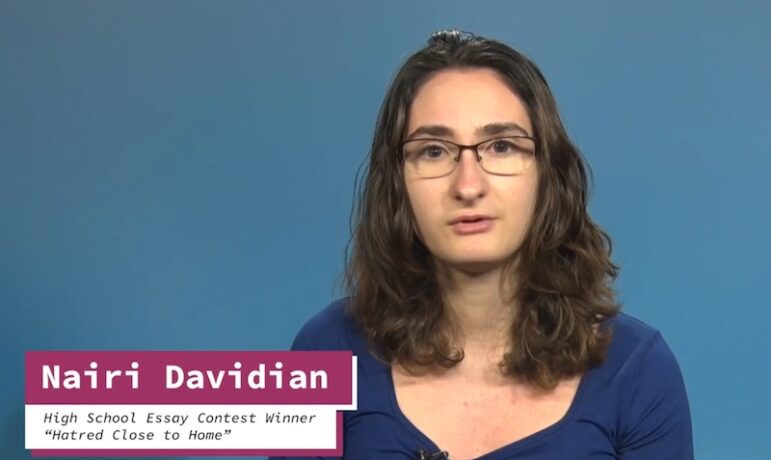
The hate crime she referenced was a note left outside St. Stephen’s Apostolic Armenian Church in East Watertown. The same church that Davidian attended the funerals of her grandparents a couple years ago.
“The message “Artsakh is Dead” was a victory cry that prioritizes land possession over the safety of fellow human beings. “Karabakh is Azerbaijan” — being in a smaller font a repetition of a cry us Aremeians have heard countless times — acted as a final blow to ensure that the tragedies of this act received the volume of intimidation that was intended by the perpetrators.
“I was not surprised that this happened. I was shocked by the fact that it happened in my hometown — a place where I had never felt threatened.”
Davidian said the response by the Watertown High School faculty and the swift action by the Watertown Police to investigate the act showed how much Watertown values every member of the community, especially in a crisis.
MLK faced hatred in his work for Civil Rights, Davidian said, but his life was a testament to “no matter what challenge you face in this world you always have the power over how you respond to these obstacles.”
“Dr. King would have commended Watertown, commended the City of Watertown for its success in education and reaction when dealing with trouble situations such as this one,” Davidian said. “Most of all, he would have championed the amount of love the people of Watertown have for each other and for the world as a whole — love so powerful that not even hatred can divide it.”
Keynote Speaker
The first Unity Breakfast was held the same year that the 2024 Keynote Speaker, Dr. Charmain F. Jackman, moved to Watertown. A licensed psychologist, Jackman founded InnoPsych Inc., an organization working to disrupt racial disparities in mental health.
She recalled how as a child she saw a PSA about how blood pressure is the silent killer. She called racial trauma and its impact on people’s mental health the silent killer of today. Race-based trauma, she said, comes from reactions people have to racial bias, discrimination, microaggressions, racial violence and racial injustice.
“While racial trauma is not a clinical diagnosis, its symptoms can mimic mental health conditions such as PTSD, anxiety, and depression. And prolonged exposure to racism can cause serious emotional distress leading to mental health conditions,” Jackman said. “Hypervigilance, avoidance of triggers, withdrawing from others, sleep disruption, nightmares trouble concentrating, flashbacks, fear that looks illogical to others but is very real to you.”
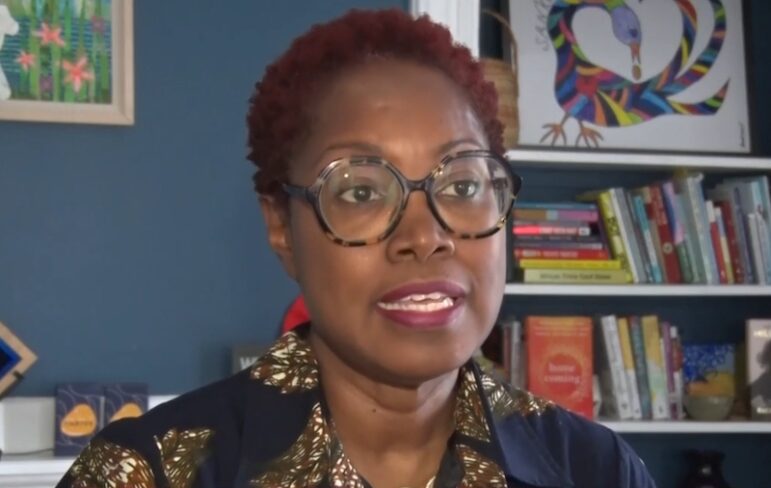
Jackman recalled her own response following the George Floyd murder when her children were playing outside in front of their home.
“I was terrified that there would be a police officer that might drive by and see the children’s playing as fighting, or maybe a neighbor might call and say they are being too loud and I feared for their safety,” Jackman said. “So, I asked them to play in the back yard. As any kid would they said, ‘Why?” But I didn’t have the words to share with them. This is racial stress.”
MLK’s Civil Rights work, Jackman believes, caused racial trauma on himself, as well as his family.
“In speaking out against the established order, MLK became a target for racial hate. He and his family were threatened and terrorized. These attacks were likely exhausting and caused significant anxiety, and probably depression,” Jackman said. “While he did not talk about mental health publicly there’s an indication of the toll that his work took on him and his family during his August 1967 address at the American Psychological Association’s annual convention. In the last few lines of speech he says, ‘I have not lost hope. I must confess that these have been very difficult days for me, personally, and these have been difficult days for every civil rights leader. For every lover of justice and peace.’”
Jackman shared three actions that people can take to make a difference.
1) Break the silence
She quoted MLK, who said, “In the end we will remember not the words of our enemies but the silence of our friends.”
Jackman said she has often been on boards or in meetings where she has experienced microaggressions, and very rarely does anyone speak up.
“They are more concerned with protecting the feelings of those who cause harm than of those who have been harmed. Sometimes I have not spoken up when I should,” Jackman said. “I’ve come to realize that injustice loves silence.”
2) Engage in political and mass actions
MLK said, “Those who love peace must learn to organize as effectively as those who love war.”
Jackman added, “MLK’s effort focused on organizing masses for political change. He recognized that the only way to make systemic change was to change laws. It worked. It was not perfect but it worked.”
She encouraged people to support campaigns that prioritize inclusion and that have diverse slates of candidates.
3) Cultivate home
Jackman said that fighting for civil rights and social justice can take a toll on people’s mental health. She encouraged people to make sure to take care of themselves.
“Stepping away from self-care can feel like abandoning the movement,” she said. “We have to cultivate hope and grow resilience. We can only be doing by caring for ourselves, and as Audre Lorde shares ‘Self-care is not selfish. It is self-preservation.”
More Speakers
Attorney General Andrea Campbell gave an opening greeting during the Unity Breakfast broadcast. She said that the civil liberties and civil rights, which MLK and other leaders fought for, continues to be a struggle today.
“You can feel a sense of despair or hopelessness. Please don’t,” Campbell said. “Because, know that if we work together, we organize, and we do everything in our power to push for everyone in our state to have everything they are entitled to, we will continue to be a model for the nation.”
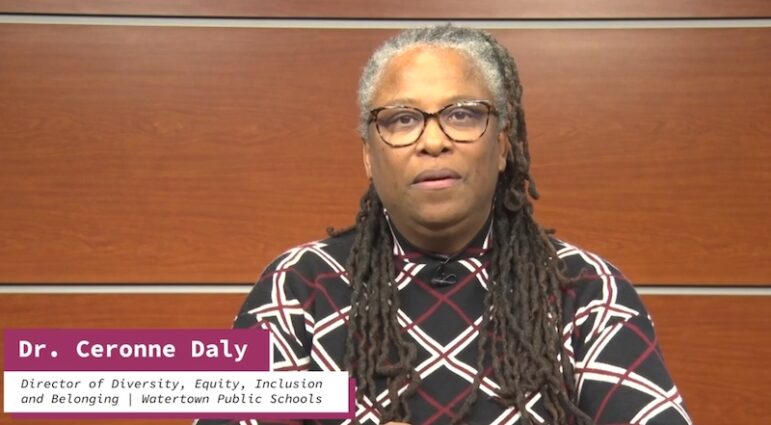
The honorary host for the Unity Breakfast, Dr. Ceronne Daly, the Watertown Public School’s director of Diversity, Equity, Inclusion, and Belonging, said that if not for the Civil Rights Act of 1963, “many of us wouldn’t be here and be able to participate as equals in our communities.” She said 2024 is a key moment in time.
“This is a time that will be memorialized in history books as a significant inflection point in America and worldwide. Systemic racism continues to form a barrier to college access, success, and affordability for low income and underrepresented minorities at every phase of the process,” Daly said. “To counteract the impacts of systemic racism we need to apply aggressive, innovative interventions at every stage. My personal and professional experiences have prepared me to lead. I rely on the intersectionality of diversity, equity, inclusion, belonging, and access to create unique spaces in an organization to support its members to thrive. This is ‘Heart Work” and requires that leaders create a supportive working environment to nurture their staff members’ well being.”
The 2024 Unity Breakfast was sponsored by the Watertown Community Foundation, and received assistance from the Watertown Public Schools, Daly said.
A Kingian Nonviolence community course will be held on March 2 and 9 at the Watertown Police Station. Find out more information and register by clicking here.
Watch the video of the 2024 Watertown Unity Breakfast by clicking here.